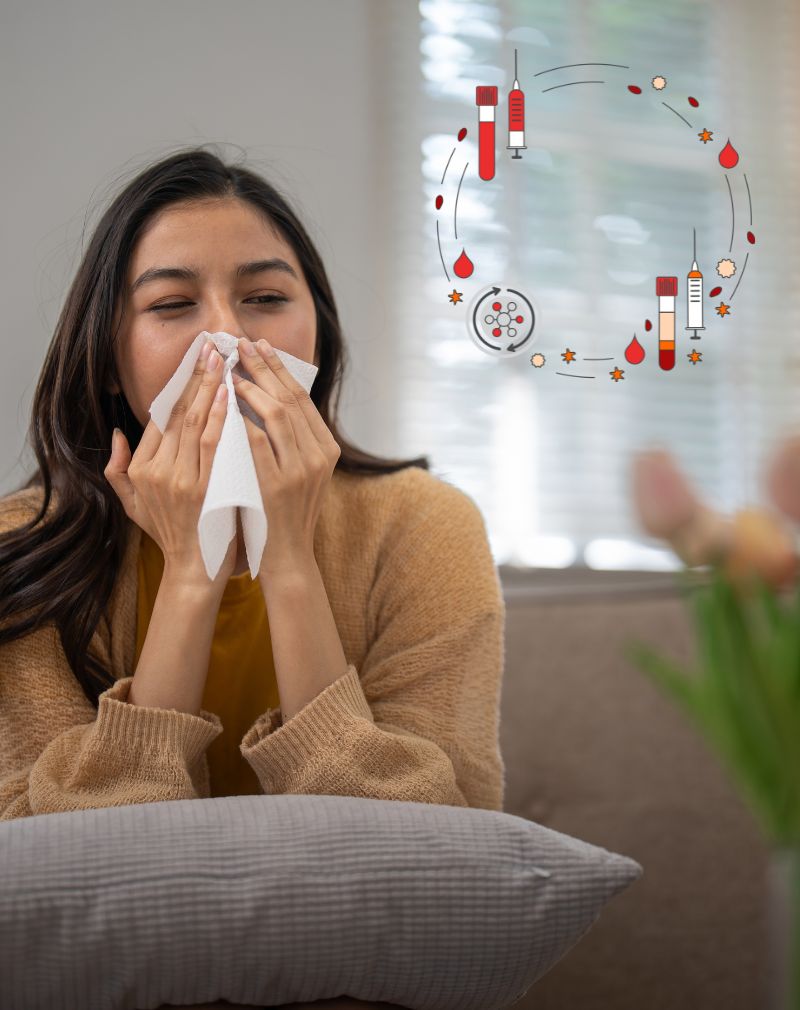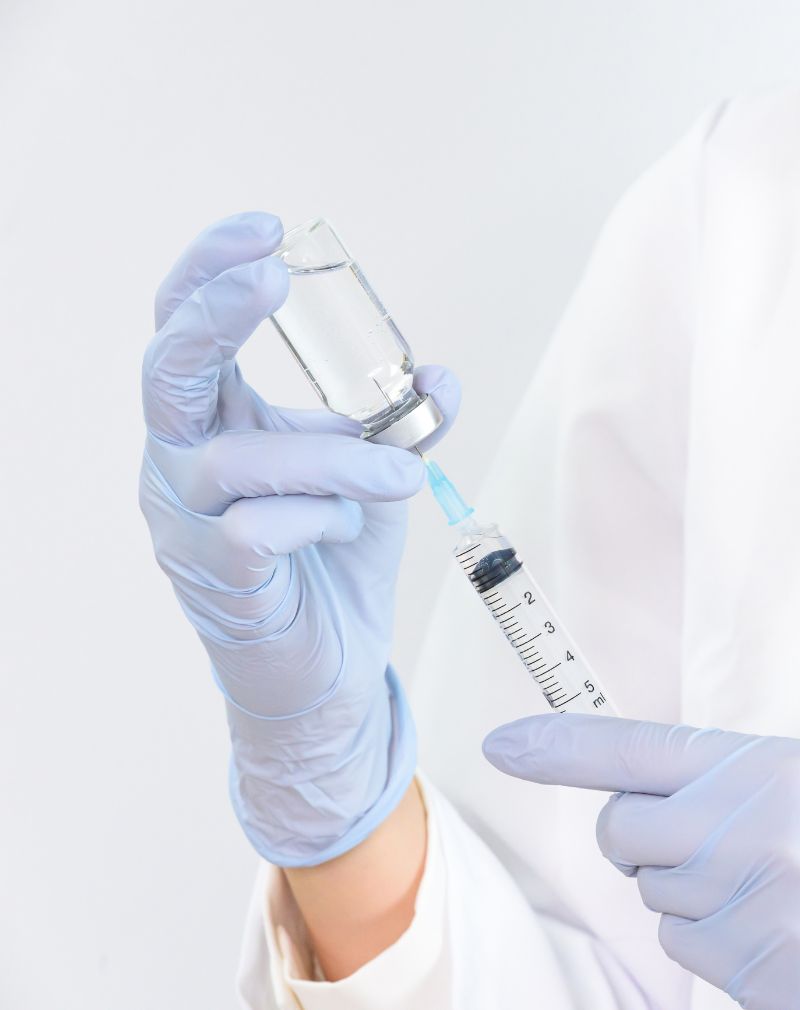You’ve been prescribed a course of antibiotics to tackle a routine infection. A few days into the treatment, instead of feeling better, you notice an itchy rash spreading across your arms. Dismissing it as harmless, you continue the medication; until the rash intensifies, accompanied by swelling and difficulty breathing. What began as a simple remedy has now turned into an alarming medical emergency.
This is the unsettling reality of drug allergies. For many, medications designed to heal can unexpectedly trigger severe, even life-threatening reactions. Drug allergies are not only unpredictable but also frequently misunderstood, often confused with side effects or intolerances. Understanding these allergic responses is vital; not just for effective treatment but also for safeguarding lives.
At The American Wellness Center in Dubai Healthcare City, the doctors at our Allergy and Immunology believe that awareness is the first step toward prevention and management. By understanding what drug allergies are and how they manifest, individuals can take informed steps to minimize risks and ensure their well-being.
What Are Drug Allergies?
Drug allergies occur when the immune system mistakenly identifies a medication as a harmful substance and mounts an aggressive defense against it. Unlike common side effects, which are predictable and often mild (e.g., drowsiness from antihistamines), drug allergies are immune-mediated reactions that vary significantly in severity.
Drug Allergies vs. Side Effects or Intolerances
- Side Effects: These are expected, non-immune reactions to a medication that occur as a direct result of the drug’s pharmacological action. For instance, nausea after taking antibiotics is a side effect, not an allergy.
- Drug Intolerance: This refers to an exaggerated sensitivity to a drug, such as gastrointestinal discomfort caused by aspirin, but without an immune response.
- Drug Allergy: This involves the immune system producing antibodies (such as Immunoglobulin E or IgE) that recognize the drug as a threat, leading to symptoms like rashes, hives, or anaphylaxis.
The Role of the Immune System
When someone with a drug allergy takes the offending medication, their immune system treats it as an invader, much like it would a virus or bacterium. This response may involve:
- Sensitization: The first exposure primes the immune system, creating antibodies against the drug.
- Reaction: Subsequent exposure triggers the release of histamine and other chemicals, leading to symptoms ranging from mild skin reactions to severe systemic effects.
While some reactions, like anaphylaxis, occur rapidly, others may be delayed, making diagnosis challenging. This highlights the importance of professional evaluation, particularly for those with repeated unexplained reactions to medications.
Common Culprits
Certain medications are more likely than others to cause allergic reactions, with antibiotics such as penicillin topping the list. Recognizing these common culprits is key to reducing risk and managing potential allergies effectively.
Medications Frequently Linked to Allergic Reactions
- Antibiotics: Penicillin and related drugs, such as amoxicillin, are well-known triggers. Sulfa-containing antibiotics are also common allergens.
- Nonsteroidal Anti-Inflammatory Drugs (NSAIDs): Medications like ibuprofen and aspirin can cause allergic reactions, ranging from mild skin irritation to life-threatening anaphylaxis.
- Chemotherapy Drugs: Used in cancer treatment, these medications can provoke immune responses due to their strong effects on the body’s cellular processes.
- Anticonvulsants: Drugs such as phenytoin and carbamazepine may cause delayed allergic reactions, often presenting as rashes or fever.
- Vaccines: Allergies may arise from the active ingredients or even trace amounts of egg proteins used in production.
Recognizing Less Obvious Triggers
In addition to active ingredients, other components in medications can act as hidden triggers:
- Preservatives: Additives like sulfites or parabens in liquid medications may provoke reactions.
- Dyes and Fillers: Inactive ingredients used to enhance appearance or stability can sometimes cause skin rashes or gastrointestinal symptoms.
- Cross-Reactivity: An individual allergic to one drug may react to structurally similar medications. For example, those with penicillin allergies may also be sensitive to cephalosporins.
This underscores the importance of detailed communication with healthcare providers about any prior adverse reactions to medications.
Symptoms of Drug Allergies
Drug allergies can present a wide spectrum of symptoms, from mild discomfort to severe and life-threatening reactions. Understanding these manifestations helps individuals recognize when to seek medical attention.
Mild Symptoms
- Skin Reactions: Rashes, itching, and redness are common initial signs.
- Runny Nose or Watery Eyes: These may mimic seasonal allergies but occur shortly after taking medication.
Moderate Symptoms
- Hives (Urticaria): Raised, itchy welts that can appear anywhere on the body.
- Swelling (Angioedema): Swelling of the face, lips, or tongue, which may signal a more serious reaction.
- Respiratory Symptoms: Wheezing, coughing, or difficulty breathing may develop, requiring prompt attention.
Severe Symptoms
- Anaphylaxis: A rapid, life-threatening reaction characterized by difficulty breathing, drop in blood pressure, and loss of consciousness.
- Stevens-Johnson Syndrome (SJS): A rare but serious disorder involving skin peeling and flu-like symptoms, typically in response to certain medications.
- Organ Involvement: Liver or kidney damage can occur in severe cases, manifesting as jaundice or dark urine.
Delayed Reactions
Not all allergic reactions occur immediately. Delayed responses, such as a rash or fever days after starting a medication, can complicate diagnosis. These reactions are often mediated by different immune pathways than immediate allergies.
The variability in symptoms highlights the importance of consulting specialists, like those at The American Wellness Center in Dubai Healthcare City, to ensure accurate diagnosis and safe management.
Diagnosing Drug Allergies
Accurately diagnosing a drug allergy is essential to ensure safe and effective treatment.
Diagnostic Methods
- Patient History: Detailed accounts of past reactions, including timing, symptoms, and the specific drug involved, help guide diagnosis.
- Skin Tests: Small amounts of the suspected drug are introduced to the skin to observe for allergic reactions.
- Blood Tests: These tests detect specific antibodies related to allergic reactions.
Consulting specialists, such as those at The American Wellness Center in Dubai Healthcare City, ensures a comprehensive approach using advanced diagnostic tools and expert interpretation.
Managing and Treating Drug Allergies
Once a drug allergy is identified, proper management becomes critical.
Steps During a Reaction
- Stop taking the medication immediately and seek medical attention.
- Use antihistamines for mild reactions or epinephrine for severe cases like anaphylaxis.
Preventative Measures
- Maintain an updated allergy list and share it with healthcare providers.
- Wear medical alert bracelets to inform emergency responders of known allergies.
Exploring Alternatives
- Substitute medications with structurally different drugs to avoid cross-reactivity.
- Desensitization protocols may be considered under medical supervision for essential medications.
When to Seek Help
Certain signs signal the need for urgent medical intervention:
- Severe Symptoms: Swelling, breathing difficulties, or loss of consciousness.
- Progressive Reactions: Symptoms that worsen over hours or days.
Expert care, like that offered at The American Wellness Center in Dubai Healthcare City, can prevent complications and improve safety through precise treatment and monitoring.
Support at The American Wellness Center
At The American Wellness Center in Dubai Healthcare City, we specialize in diagnosing and managing drug allergies with:
- Comprehensive Testing: Advanced diagnostic tools to pinpoint allergies accurately.
- Personalized Care: Tailored strategies to manage individual needs effectively.
- Expert Guidance: Experienced professionals providing clarity and confidence in care.
Next Steps
Drug allergies can disrupt lives, but with awareness, accurate diagnosis, and effective management, they can be safely navigated. Early identification and expert care not only reduce risks but also empower individuals to take control of their health.
If you suspect a drug allergy, don’t hesitate to consult the specialists at The American Wellness Center in Dubai Healthcare City. With the right support, safety and peace of mind are within reach. Contact us Today!



